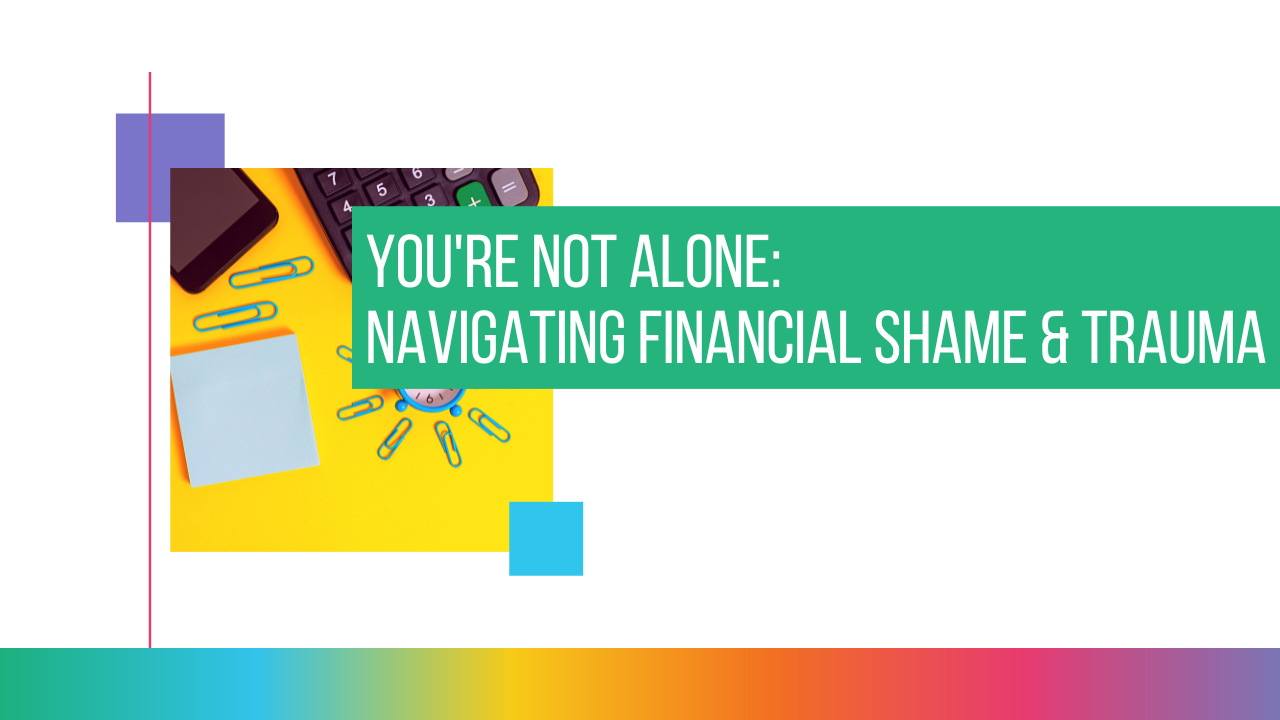
You're Not Alone: Navigating Financial Shame & Trauma
Sep 22, 2022On the final day of FinCon 2022 (a conference just for personal finance geeks who love to blog/podcast/etc.), I attended a panel called, “Financial Trauma: Navigating Shame and Privilege.” Honestly, I wasn’t expecting much. I sort of expected personal finance professionals who themselves had never been unable to pay rent to give us neat, tidy advice about budgeting and debt management; topics which are often pretty inaccessible at certain points of poverty.
Y’all, I was blown away. The vulnerability and honesty shared by the members of that panel – whose information will be included at the end of this post – was incredibly touching and affirming. As I looked around the ballroom, I saw more folks nodding and snapping and even crying than I’d noticed all week. Even for people with an expertise or passion for personal finance, there was still so much resonance surrounding financial shame and trauma.
On the heels of FinCon, we wanted to take a minute to dig into financial shame: what it is, how it might be impacting you, how not alone you are, and what you can begin to do to feel better.
What is financial shame?
In a 2021 article for NerdWallet, CFP Liz Weston wrote, “Too often, though, people feel there’s something deeply wrong with them if they struggle with their finances. They may feel they’re stupid, immoral, lazy or “bad with money,” or ruminate on what they should have done differently.”
I’ve always considered financial shame to be the deep-rooted belief that your financial problems are your fault. You might have even heard those words exactly from an authority figure before– maybe a family member or a teacher or a big-time finance expert. And, look, of course, we all make mistakes. Everyone makes mistakes with their finances. The issue is more that we exist within a tough system which does not always set us up to flourish.
From the same NerdWallet article, here’s a quote from therapist Ed Coambs, who actually spoke at the aforementioned FinCon panel: “Money shame can lead us to overspend to “keep up with the Joneses,” avoid our finances or criticize others who are struggling.” So, money shame is painful in and of itself, but it also keeps us trapped in a bad cycle.
Financial shame can be even tougher when you’re a member of the LGBTQ+ community. A 2019 poll found that “personal finance makes 42% of LGBTQ people feel depressed, versus 31% of heterosexuals; meanwhile, LGBTQ people were 7% more likely to feel shame about their finances.”
Across the board, financial shame hits harder for those outside of the white, cisgender, straight man’s experience: As Chole McKenzie of BlackFem, Inc. pointed out just last month for the National Endowment for Financial Education, “Financial literacy … purports that the cause of financial stress and hardship are not structural but simply behavioral. If our understanding of economic inequality stands on this premise, things get racist and sexist rather quickly.” McKenzie also says of financial trauma, “This not only limits a person’s ability to build wealth, but it also causes traumatic financial stress; it requires those with the least power to somehow build enough power to fix a system that was designed to harm them in the first place. “
How can I feel better?
Real talk, pals: Financial shame absolutely resonates for me. As I sat in that FinCon panel and listened to so many stories, I felt myself on the verge of tears. I have often felt that my personal finance problems just wouldn’t exist if I was “better.” If I was “good enough.” And getting a full-time job didn’t magically make those feelings go away, which is what I thought would happen. I’ve still got a long way to go to heal my own relationship with money.
My first piece of advice is to take a deep breath. You’re not alone, and it’s going to be okay. Financial shame might be linked to a variety of other anxieties and fears, in which case a tangible first step might be talking to a therapist or counselor. If even that feels too intimidating at first, consider doing some journaling about the topic. You deserve to get those feelings of shame out of your body and into the world. I oftentimes find the monster easier to battle if I can see them clearly, you know?
I also recommend finding a personal finance expert who truly shares your values. Even if you just get started by following a good blog, it’s a huge game changer to get your advice from someone who will not make you feel small because of your unique lived experience. Last year we did a blog post about some amazing personal finance bloggers, if you need a good place to start looking. (And we’ve found more since then, so hit us up for more suggestions, please.)
So, take another deep breath, if you can. There’s information out there, and there are people who can help. I think maybe we only beat this thing by speaking up and by allowing ourselves to receive help within an unjust system.
FinCon 2022 panelists worth checking out:
Looking for the latest mini-courses?
Ready to become a full-fledged money nerd?
Young & Scrappy Masterclass Lifetime Members get an all-access pass to our full series of mini-courses!
We hate SPAM. We will never sell your information, for any reason.

